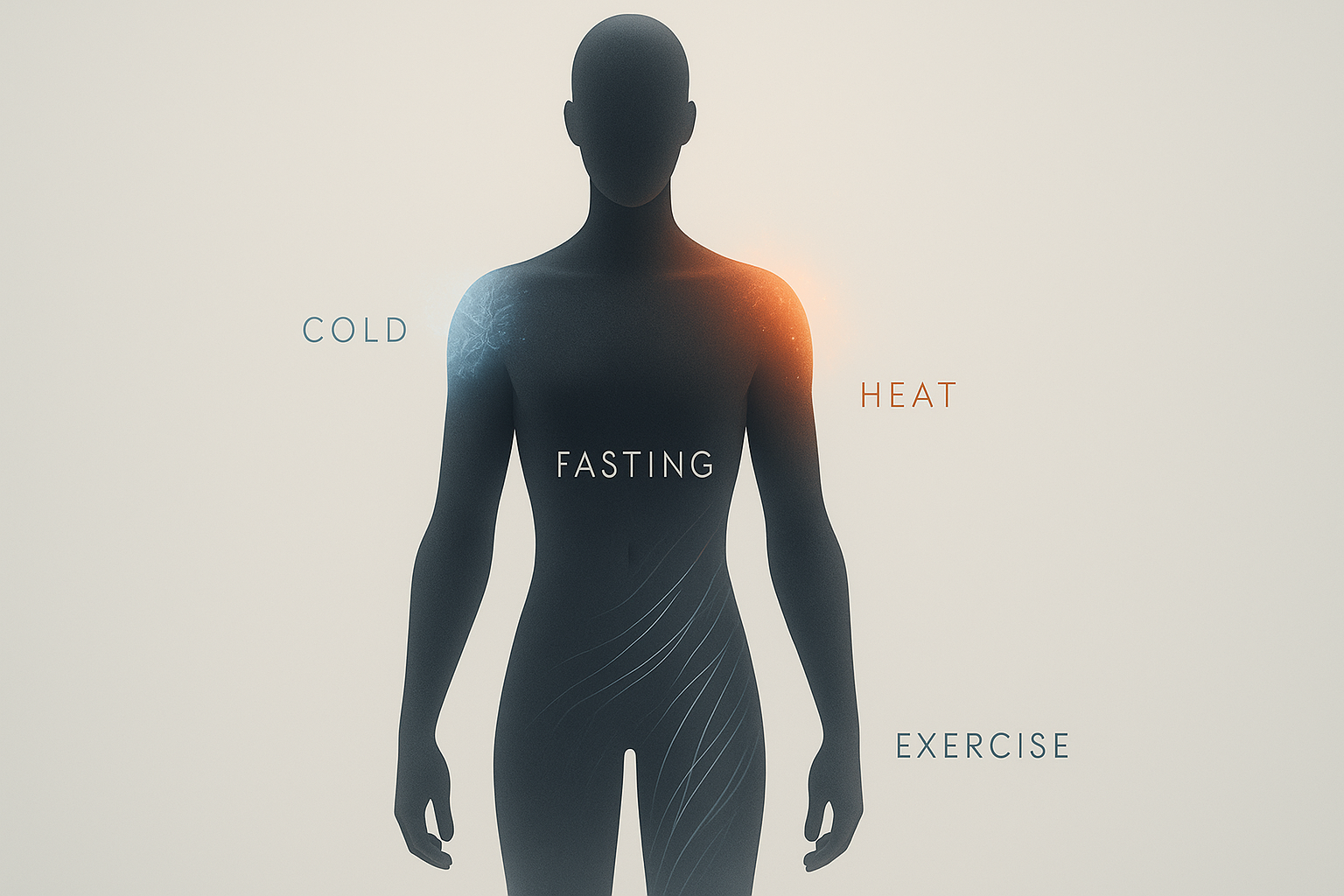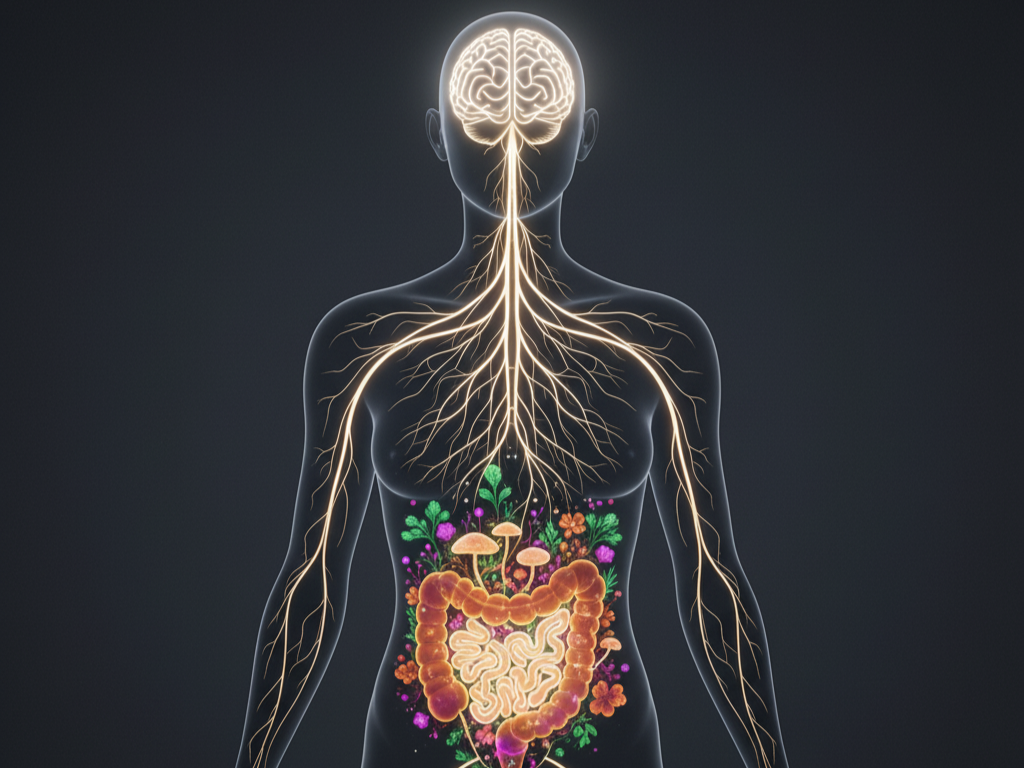Listen to the article as a podcast (beta)
KEY TAKEAWAYS
- Stress is a Physical Response, Not Just a Feeling: Emotional balance isn't about eliminating stress; it's about learning to control your body's physiological reaction to it. Your body has two primary operating modes controlled by the Autonomic Nervous System: Sympathetic ("fight-or-flight") for alertness and action, and Parasympathetic ("rest-and-digest") for calm and recovery.
- The Problem is Chronic Cortisol Elevation: In modern life, constant stressors keep our "fight-or-flight" system chronically activated, leading to elevated levels of the stress hormone cortisol. Long-term, this can cause brain fog, abdominal weight gain, hormonal imbalances, and accelerated aging. The key to emotional balance is learning to manually switch back to the "rest-and-digest" state.
- Master Both Short- and Long-Term Tools: You can manage stress in the moment with powerful, breath-based tools like the "Physiological Sigh." For lasting resilience, you need sustainable, long-term habits like regular time in nature, mindful movement, and nurturing social connections.
In a world that demands our constant attention, "stress" has become a default state of being. We're expected to be always on, always connected, and always productive. But this way of life comes at a cost to our mental and physical health. The solution, however, isn't to escape modern life, but to learn how to navigate it with skill.
Emotional balance is not a personality trait you're born with; it's a physiological skill you can learn. This guide will bypass abstract advice and give you a practical, science-backed toolkit to understand and control your body's response to stress, empowering you to find calm amidst the chaos.
Your Body's Two Operating Systems: Meet Your Nervous System

To control your stress, you first need to understand where it comes from. Your Autonomic Nervous System is the control panel for all your automatic bodily functions, and it has two main branches that act like a seesaw:
- The Sympathetic Nervous System (The "Gas Pedal"): This is your "fight-or-flight" system. It prepares you for action by increasing your heart rate, sharpening your focus, and releasing adrenaline and cortisol. This is a good thing—it's what allows you to perform and act decisively, but only if it's a short-term, not a permanent, state.
- The Parasympathetic Nervous System (The "Brake Pedal"): This is your "rest-and-digest" system. It promotes calm, recovery, and digestion by slowing your heart rate and conserving energy. The primary nerve of this system is the vagus nerve. You run into a major problem when you are unable to guide your mind and body into this state.
A healthy, resilient person is able to move flexibly between these two states. The problem arises when we get stuck on one side.
The Danger of an Always-On "Alert" Mode
For our ancestors, the "gas pedal" was pressed for short, intense periods—like escaping a predator. In modern life, digital notifications, back-to-back meetings, and financial worries act as constant, low-grade threats, keeping our Sympathetic system perpetually engaged. This leads to a state of chronic stress, driven by one key hormone: cortisol.
The Cortisol Connection: When Stress Becomes Toxic
Cortisol is your body's primary stress hormone. In short bursts, it's incredibly useful—it provides a quick burst of energy, heightens memory, and increases your pain threshold. However, our modern life keeps the tap on, flooding our system 24/7, making it corrosive. Chronically elevated cortisol can lead to:
- Brain Fog and Cognitive Decline: It can damage the hippocampus, the area of your brain responsible for learning and memory. The good news? The brain has remarkable plasticity. By actively working to lower your cortisol levels, you can support neurogenesis—the birth of new brain cells—and significantly improve your mental clarity over time.
- Abdominal Weight Gain: Cortisol signals the body to store visceral fat around the organs in your abdomen. Reducing your cortisol levels is a critical step in signaling to your body that it's safe to let go of these protective fat stores.
- Hormonal Disruption: Chronic stress puts your body in survival mode. To produce extra cortisol, it "steals" the building blocks from other essential hormones, potentially leading to lower testosterone and an excess of estrogen in both men and women.
- Accelerated Aging: High cortisol levels can break down collagen in the skin and contribute to cellular aging.
- Mental Health Challenges: Chronic exposure is strongly linked to an increased risk of anxiety, depression, and complete burnout.
The skill of emotional balance is learning how to manually press the "brake pedal" and give your body a break from this constant flood of cortisol.
The Toolkit: Simple, Science-Backed Tools for Real-Time Stress Control
Here are three powerful, physiology-based tools you can use anytime, anywhere to regain control in the moment.

The Physiological Sigh: Your Built-in Reset Button
How: Take two sharp inhales through your nose, followed by a long, complete exhale through your mouth.
Why it Works: This is the fastest known way to voluntarily calm your nervous system by signaling the vagus nerve to slow your heart rate.
The Physiological Sigh: Your Built-in Reset Button
How: Take two sharp inhales through your nose, followed by a long, complete exhale through your mouth.
Why it Works: This is the fastest known way to voluntarily calm your nervous system by signaling the vagus nerve to slow your heart rate.
The 5-4-3-2-1 Grounding Technique
How: Name 5 things you see, 4 you feel, 3 you hear, 2 you smell, 1 you taste.
Why it Works: It pulls your attention out of abstract worries and into the physical present, breaking the stress cycle.
Building Long-Term Resilience: Sustainable Habits for an Unstressed Life
While in-the-moment tools are crucial, the ultimate goal is to build a life that is naturally less stressful. This is achieved through consistent, long-term habits.
Connect with Nature:
A simple, screen-free walk in a park or forest for a few hours once a week can be enough to reset your baseline cortisol levels.
Engage in "Flow State" Hobbies:
Find a hobby that completely absorbs your attention (like painting, playing an instrument, or gardening). This state of deep focus is a powerful antidote to stress.
Practice Mindful Movement:
Moderate, mindful movement like yoga, tai chi, or a brisk walk helps lower baseline cortisol levels and improve your body's long-term resilience to stress.
Set Digital Boundaries:
You don't need a full "digital detox." Start with small boundaries, like a "no phones for the first hour of the day" rule, to create pockets of mental space.
Nurture Your Social Connections:
Meaningful, positive relationships are one of the most powerful buffers against stress. Spending quality time with loved ones releases hormones like oxytocin, which directly counteracts the effects of cortisol and promotes a sense of safety and well-being.

How long does it take for neurogenesis (creating new brain cells) to occur?
Neurogenesis is a continuous process, but you can significantly support it. Studies suggest noticeable improvements in cognitive function and mood can be seen after 8-12 weeks of consistent, stress-reducing activities. For both prevention and restoration, you can also use specialized, premium-quality supplements with high, effective doses of active ingredients.
If I lower my cortisol, how long until my abdominal fat reduces?
There is no fixed timeline. However, reducing cortisol is a critical first step. When your body is no longer in "emergency storage" mode, your other efforts (like a healthy diet and exercise) become significantly more effective.
Can psychotherapy help me manage stress?
Absolutely. Therapy helps you understand and reframe the psychological triggers that cause stress in the first place, working perfectly with the physiological tools in this guide.
When should I see a psychiatrist?
If stress feels overwhelming and is significantly impacting your daily life, seeking professional help is a sign of strength. The tools in this guide are for building resilience, not a replacement for professional medical care when needed.
Are there supplements that can lower cortisol?
Yes, but the market is flooded with low-quality products using "dusting" (tiny, ineffective doses). High-quality, clinically-dosed adaptogens like Ashwagandha (standardized for at least 5% withanolides) and Rhodiola Rosea (standardized for 3% salidroside and 1% rosavins) are effective. Phosphatidylserine can also help. Quality and dosage are everything.










